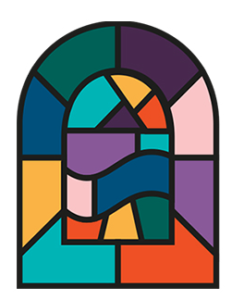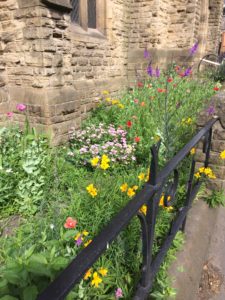The Sermon
By the Revd. Captain Ian Maher
Chapter 6 of John’s gospel is a passage of scripture that includes the story of Jesus feeding the 5,000, and the writer’s extended reflection on Jesus as the Bread from Heaven. In fact, including today, it has provided the gospel reading for the past five Sundays (Trinity 8 through to Trinity 12).
When Jesus fed the 5,000, it was an eye-catching miracle which resulted in many of the people wanting to seize Jesus and make him king by force. This was not what Jesus wanted so he withdrew to a mountain to be alone.
Next day, when the crowd found Jesus at Capernaum, he recognised their fascination with the multiplication miracle so challenged them not to focus their energy on food that will perish but on the food that endures for eternal life which the Son of Man – that is, Jesus – would give them.
The crowd then responded to Jesus with their own challenge, by asking for a sign of his authority, citing the story of manna in the wilderness while under the leadership of Moses as though it were a benchmark. Jesus reminded them that the Father, not Moses provided the bread from heaven and that the true bread of God is that which comes down from heaven and gives life to the world. To the request for that bread, Jesus replies:
I am the bread of life. Whoever comes to me will never be hungry and whoever believes in me will never be thirsty.
This led Jesus into some prolonged discussion about what that meant exactly and is picked up in the rest of John chapter 6, the final verses providing this morning’s gospel reading, and in which Jesus re-states the way in which he is the true bread from heaven:
Those who eat my flesh and drink my blood have eternal life, and I will raise them up on the last day; for my flesh is true food and my blood is true drink. Those who eat my flesh and drink my blood abide in me, and I in them.
What is important to remember is that we, as readers of John’s gospel, have some insights into the profound theological claims about Jesus being made by the gospel writer that many of the crowd in the story were unlikely to have appreciated. That goes some way towards explaining why so many times in John’s gospel, the followers of Jesus never seem to get the point about the signs that he gives them. Embedded within the Jewish monotheistic tradition, it is just too much of a stretch for them to embrace the implications of Jesus’ claim to be the bread of life.
Through a Christian incarnational lens, however, the identification of Jesus with the bread of life still confronts us with a challenge: How are we to avail ourselves and be sustained continually by Jesus as that source of life which does not perish? How are we to draw strength from him? How are we to be fed and sustained by him in a world where so much is taking place to starve us of hope? Here are a few thoughts which I hope might be of use.
First, we need to be prayerful people. We must stay connected to the life of the risen Jesus; nourished by him daily as the bread of life. We can do this by pondering regularly on the life, ministry, and teaching of Jesus as portrayed and reflected upon in the gospels and the rest of the New Testament, in order that we might align our lives more closely with the life of Christ.
In the Christian life, prayer and reflection on the Bible are too often casualties in the middle of the hustle and bustle of everyday life, with the result sooner or later we dry up spiritually. It might be a sobering exercise for each of us to reflect on how much time is spent in prayer and Bible study over the course of a week. If we are not listening, how, I wonder, are we to hear what God is saying to us in our lives?
While I agree absolutely with the dictum that those who are too heavenly minded are of no earthly good, there is an opposite danger. Activists – even radical ones – who neglect the life of prayer, run the risk both of burnout and of missing the bigger picture. To nurture the spiritual life, we must foster a sense of 'being' as well as a practice of 'doing'.
Second, we need to be the vehicles through which the life of Christ is made known to others. Acts of kindness, compassion, selflessness, and generosity, undertaken in Christ’s name are an extension of his life in the world: 'doing' as well as 'being'. We are together, after all, the body of Christ in the world. Through such practical acts of love, we manifest the life of God in our own lives and to the lives of those to whom we reach out; in that way we make present the bread of life.
Importantly, those whom we seek to serve will also be channels of God’s grace to us – a truth that we sometimes miss – because Christ is present in the poor, the sick, the hungry, the outcast, and refugee. It is often in such encounters that we find ourselves nourished spiritually by the presence of Jesus: the minister becoming the ministered-to. The Christ in them meets the Christ in us.
To partake of the bread of life is to align ourselves with the agenda of Christ in the world. It is about giving but also being open to receiving in the knowledge that God’s provision is sufficient for all when shared as intended – an important insight from the story of Jesus feeding the 5,000.
Third, our participation in the Eucharist brings us into a sacramental encounter with Jesus, the bread of life and true bread from heaven. Each time we gather at the altar it is a declaration of our participation in his risen life and we are fed spiritually. In that sense, the Eucharist is our spiritual food for the journey through life.
It is a visible, experiential sign of the intimate relationship that God has made available to us through Jesus. In sharing in the bread of life we become one with that life. What greater sign can there be of us partaking in the very life of God that receiving the bread of which Jesus said: This is my body?
Summed up in three words: prayer, service, and sacrament. These are the things which connect us with an experience of the risen Christ, the living bread from heaven, in the here and now. This bread from heaven is God's sustaining gift to the world, for the benefit of all and to God's glory.
My sisters and brothers, through our faith and trust in Jesus Christ; in feeding our souls on his life and teaching; by fashioning our lives after the example of his own; and through sharing in his sacramental presence at the Eucharist, Jesus is for us – day by day – the bread of life. He is the one who sustains us through whatever challenges life’s journey places in our way. So, in all these ways let us feed always on Jesus, the bread of life, in our hearts by faith, with thanksgiving.
Let us pray.
Heavenly Father, you give us the body and blood of your Son as food and drink for our pilgrim journey. Grant that through our union with him we may be united with one another as members of his body, through Christ our Lord. Amen.




